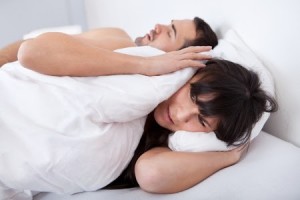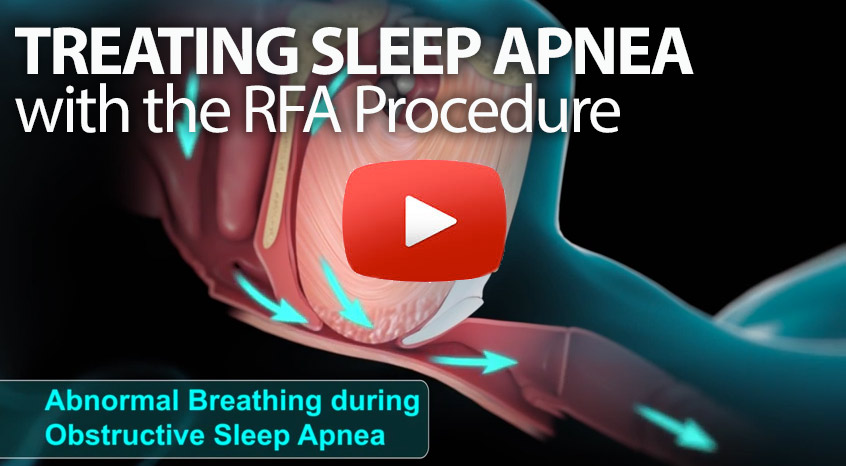Sleep apnea sufferers are noted for having several moments of breathlessness, where they stop breathing altogether. People who suffer from sleep apnea can stop breathing for a few seconds, with chronic suffers not being able to breathe for up to several minutes. Secondary effects of arrested breathing also include frequent awakenings, chronic headaches and migraines, loud snoring that can disturb partners, as well as memory loss. There are two distinct forms of sleep apnea, with a similar effect on the sufferer.
- Obstructive sleep apnea is when the throat slowly closes, with shallow breathing that eventually stops altogether. Your brain will fire neurons, noting that it is short on breath, causing you to wake up.
- Central sleep apnea is when the brain stops sending reliable messages to the automatic throat muscles that regulate movement. Central sleep apnea can also affect muscle movements of the lungs, as well as the heartbeat. Neurons misfire, causing your breathing to become inconsistent.
Many people fear sleep apnea – and it doesn’t help that the ailment tends to be shrouded by myths and half-truths. These are some of the more popular myths surrounding this sleeping disorder. Being informed about sleep apea will allow you to tackle the problem.
Myth #1 Sleep Apnea Is Just Loud Snoring. Although snoring is a noted symptom of sleep apnea, it is much more than that. Sleep apnea involves the muscle surrounding the mouth, throat, and oral cavity, with sufferers not breathing for several second.
Myth #2 It Will Go Away On its Own. Certain foods or medications may trigger symptoms that are akin to sleep apnea, which can be quickly remedied by changing dosages or the types of medications being used. However, ongoing sleep apnea is dangerous – it can take a toll on someone’s quality of life since they will have a hard time enjoying the slew of benefits from a restful night of sleep.
Myth #3 Sleep Apnea Only Happens To The Elderly. Even though the elderly is a risk group, the thought that they are the only demographic that can suffer from sleep apnea is nothing further than the truth. Sleep apnea can affect people of all age groups, including children. One of the more common factors that may increase your chances of sleep apnea is being overweight, being male, or being African American.
Myth #4 Sleep Apnea Suffers Will Need A CPAP Machine For The Rest Of Their Lives. A CPAP machine, or a continuous positive airway pressure machine, is commonly used to help alleviate sleep disorders. A CPAP machine uses high pressure to prevent sleep apnea from happening. Even though this machine is relatively successful, there are other, less obtrusive ways of dealing with sleep apnea. Revolutionary treatments like radio frequency ablation can help sleep apnea, sufferers. Radiofrequency ablation is non-invasive and effective, requiring just a couple of days of recovery. With an anesthetic applied to the tongue, a doctor will apply a high heat radio frequency at the base of the tongue, treating the problem areas that are causing sleep apnea.
Myth #5 People Who Suffer From Sleep Apnea, Know That They Have It. Most people who have sleep apnea, may not notice that they may have it due to the fact that ailment occurs while they are asleep. Spouses tend to be the first to note their unusual breathing patterns and the unnaturally loud snoring.
Myth #6. Alcohol Relaxes, So It Can Relax Muscles Affected With Sleep Apnea. A cup of your favorite spirits may induce sleep, but it is not a remedy for sleep apnea. Alcohol will not promote quality sleep.
To understand the implications of sleeping disorders, and how you can take control of your symptoms, you can also follow us @mysleepapneamd
If you or someone you know is in need of a better night’s sleep, contact us for a no obligation consultation. We are the sleep specialists at Chevy Chase ENT located in the Virginia, Maryland, and Washington D.C. metro area dealing with sleep apnea and sleep-related problems. We can help diagnose your condition, recommend whether a sleep study would be beneficial, and offer you a variety of treatment options including CPAP, Radio Frequency Ablation (RFA) and more.

